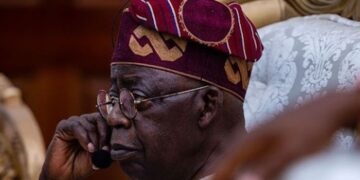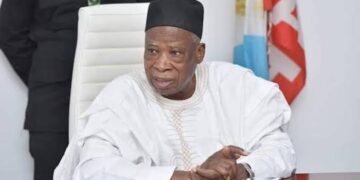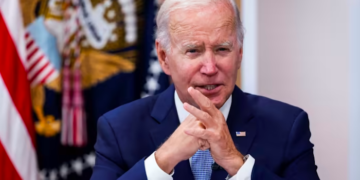The 2023 appropriation bill predicts that Nigeria’s government would spend N1.1 trillion on overhead next year, a 40 percent increase from this year. This is despite the fact that the government is facing increasing pressure to pay down its massive debt load.
The World Bank projects in its recently released Africa Pulse report that by 2022, Nigeria’s debt service will have more than doubled revenue as government revenue has failed to keep pace with debt repayment.
The N1.1 trillion is used for operational costs, which include travel, rent, utilities, repairs, and maintenance.
They won’t factor in overhead expenses like those for equipment, labor, materials, and other items directly related to providing or making a product or service.
President Muhammadu Buhari’s budget blueprint states, “we will further improve our business-enabling environment, accelerate current revenue-based fiscal consolidation efforts, and strengthen our expenditure and debt management” to achieve “fiscal sustainability.” However, the document makes no mention of cutting costs.
The budget for labor is N5 trillion, 21.4% more than last year, and the budget for pensions, gratuities, and other benefits for retirees is N854.8 billion, also an increase of 21.4%.
The “Budget of Fiscal Consolidation and Transition” expenditure plan will put Nigeria on a path toward a historic budget deficit, putting the country 20.5 percent higher in debt, given the plan to borrow N8.8 trillion in 2023, up from the N7.3 trillion anticipated for this year.
Read more about how the Nigerian government claims that rising insecurity is necessitating increased borrowing here.
For the Organization for Economic Co-operation and Development, “fiscal consolidation” is “specific strategies targeted at lowering government deficits and debt buildup.”
Muda Yusuf, who also serves as the director of the advocacy group Centre for the Promotion of Private Enterprise, has stated, “Generally, there is a need to cut back on expenditure across the board, particularly in the recurring area.”
We need to reduce spending across the board, not only in areas like utilities and salaries. Unfortunately, the government doesn’t appear to be doing anything to change the situation. When faced with a shortfall, “they find it just convenient to go and just borrow primarily from the CBN to fill all those gaps,” Mr. Yusuf said.
Next year’s debt service will take N6.3 trillion, an increase of 70.3% from this year’s projections, while the financing shortfall increases to N10.8 trillion.
“This (funding deficit) represents 4.78 percent of anticipated GDP, beyond the 3 percent threshold stipulated by the Fiscal Responsibility Act of 2007,” the budget reports.
Nigeria, which lost its title as Africa’s top oil producer to Angola in August as the country struggles with oil theft that has robbed the government naked for years and decreased production, is now facing increases in overhead and recurrent spending.
It is preventing Nigeria from benefiting from the oil boom that has helped other producers cash in on skyrocketing prices due to a shortage of crude fuelled by Russia’s conflict with Ukraine.
It also supports the argument that Nigeria’s oil is a resource curse rather than a boon.
According to the state-owned oil company NNPC, a four-kilometer oil pipeline that has been operating underground for close to a decade was discovered in Delta State last week.
According to official figures released on Monday, Nigeria’s oil output for September fell by 3.6%, reaching a new multi-decade low of 937,766 barrels per day (bpd).
Over half lower than the average daily production for this year, and yet dozens of miles away from the government’s goal of 1.7 million bpd for the coming year.
President Buhari is basing his ambitious but precarious spending plan on three questionable assumptions: a GDP growth rate of 3.8% despite recurrent rate hikes; an exchange rate of N435.6 to a US dollar.
Mr. Buhari stated in his budget address that the fuel subsidy will be eliminated in the next year. Despite this, his administration anticipates a whopping N6.7 trillion in revenue from the wildly expensive scheme that gives Nigerians some of the lowest pump prices in the world.
That’s 36.5% more than what’s needed to fund the Lagos-Kano rail project, a railway track connecting Nigeria’s two main commercial centers at an estimated cost of $11.3 billion.
To clarify, what he’s stating is that $3+ trillion in costs and revenues have been factored into the current budget. Mr. Yusuf, referring to the president’s subsidy plan for 2023, added, “That is assuming the thing will stop by the middle of next year.”
You can’t make such a commitment because you’re leaving at that time. It would be very simple for the next administration to announce to the public that subsidies has been eliminated.





























